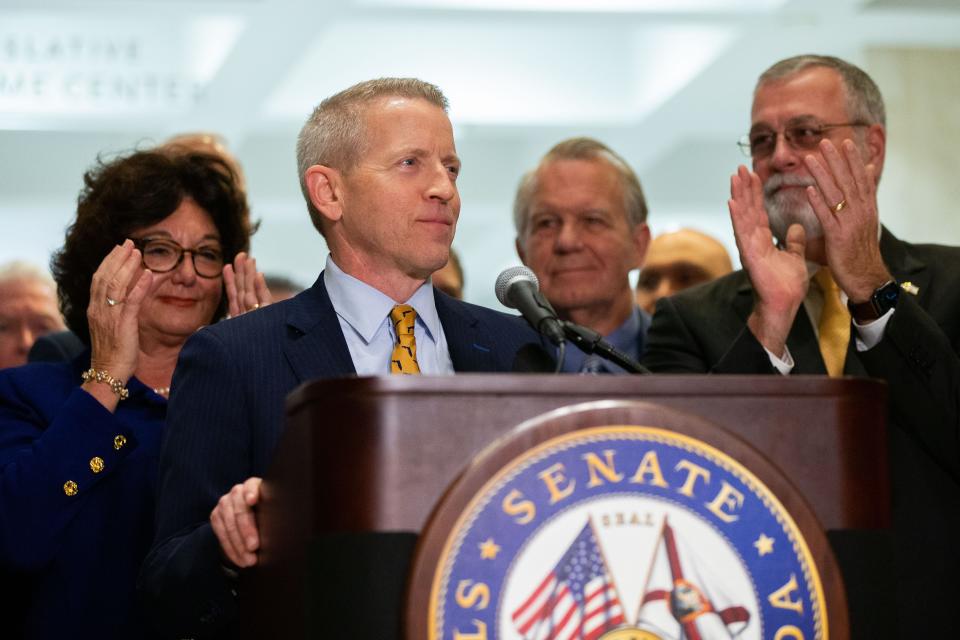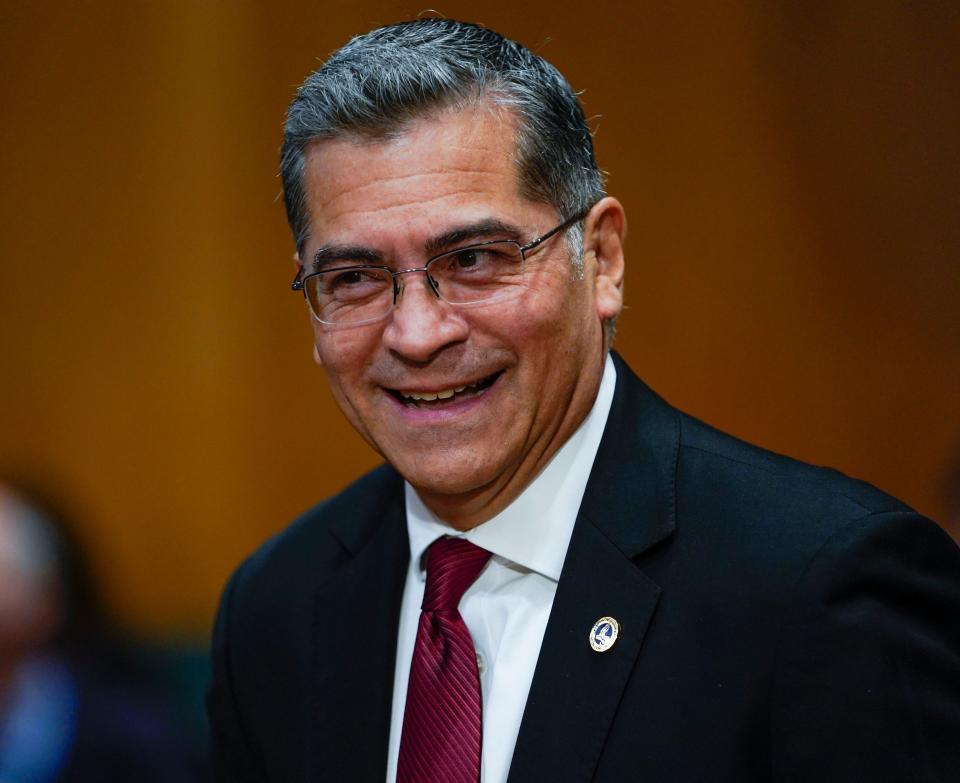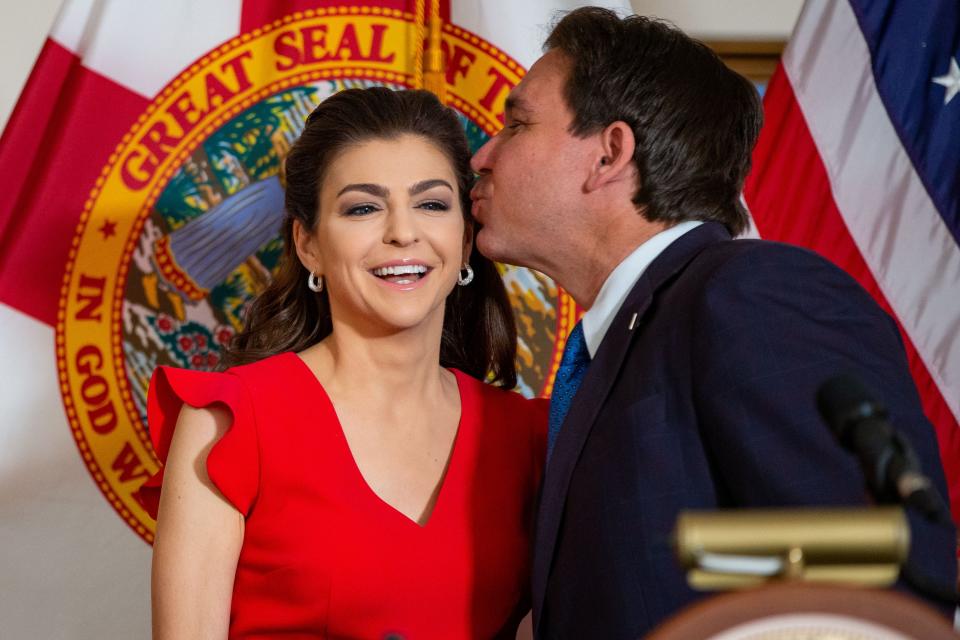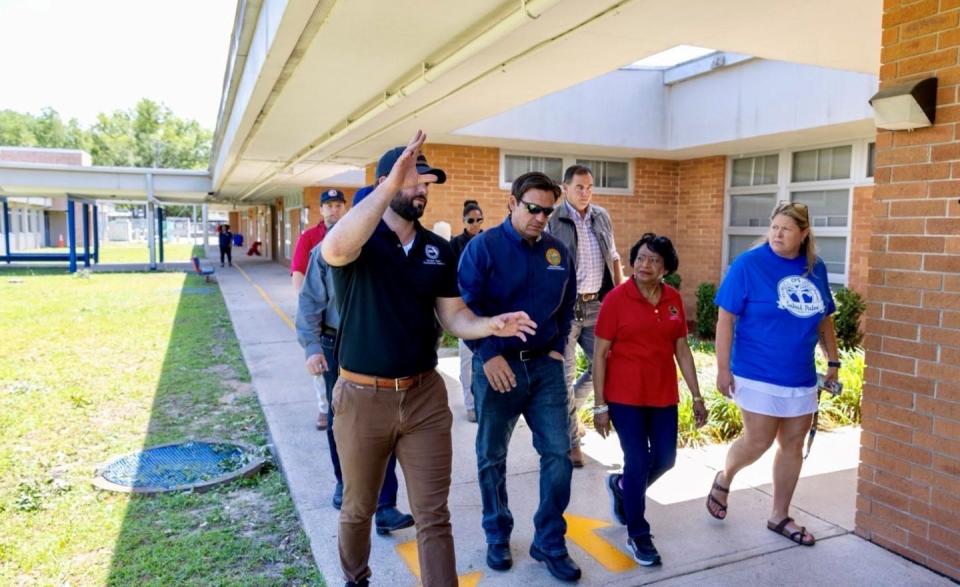DeSantis' conservative policies may cause a season of shortage for Florida kids
- Oops!Something went wrong.Please try again later.
TALLAHASSEE – With schools soon letting out for summer, Florida’s poorest children face a season of shortage – with food programs and health coverage lacking because of actions taken by Gov. Ron DeSantis, advocates say.
Florida is among 15 states shunning the federal government’s Summer EBT program that will steer $120 to each eligible child for groceries. Most kids who qualify for the program have received free and reduced-price lunches at school.
But those end when classes let out.
About 2.1 million low-income kids could’ve qualified for more than $250 million in federal aid. But the DeSantis administration said ‘no,’ arguing that existing state and federal food banks and distribution centers provide enough.
Others disagree.
“We just cannot reach the number of children in need that would’ve benefited from getting food money on these EBT (Electronic Benefit Transfer) cards,” said Florence French, Southeast senior regional organizer for Bread for the World, a national hunger relief organization.
While French and dozens of faith-based and other non-profit groups are urging the state to meet an Aug.15 deadline to apply for next summer’s EBT program, food access is not the only children’s issue running afoul of DeSantis.
Florida suing Biden administration over new children's requirement
The Republican governor is suing the Biden administration over a requirement enacted by Congress that children must remain enrolled in a Children’s Health Insurance Program (CHIP), even if they cannot pay monthly premiums.
“Ensuring 12 months of uninterrupted health coverage for children promotes access to appropriate preventive and primary care,” the U.S. Department of Health and Human Services said in a letter last fall to states.
Florida is among only a handful of states that charge these low-income families for CHIP coverage, which in the state is provided under the KidCare program.
In the federal lawsuit filed in Tampa, the state is arguing that the continuous care requirement should be thrown out – for Florida and nationwide. The Biden administration Tuesday sought to have the state’s lawsuit dismissed.
The state’s Agency for Health Care Administration (AHCA) has said in a statement, “Allowing disenrollment for nonpayment of premiums is crucial to maintaining the integrity and long-term sustainability of the program and helps Florida continue to maintain its high level of quality service for KidCare participants.”
Although 70% of the program’s financing is covered by the federal government, Florida maintains it could cost taxpayers $1 million-a-month to keep nonpaying kids enrolled. The state budget DeSantis is expected to sign in coming days includes a $14.6 billion surplus.

House speaker also weighed in on social media
House Speaker Paul Renner, R-Palm Coast, also weighed in on the continuity of coverage clash – posting recently on X that Biden “is playing games with children’s healthcare, undermining KidCare – a program intended to provide parents an on-ramp to self-sufficiency and hijacking it by turning it into a program that encourages full dependency on the government and costs every taxpayer.”
A year ago, the Republican-controlled Florida Legislature expanded eligibility in KidCare to 300% of the federal poverty limit – up from 200%. That would potentially provide insurance to an additional 42,000 youngsters, qualifying children in three-person families that now earn as much as almost $75,000.
But the expansion enacted by DeSantis last year hasn’t happened. The state failed to properly apply for federal permission for the expansion and the lawsuit launched in February has further clouded the effort since the state is disputing the program’s requirements.
'Unacceptable numbers' of children losing care, Becerra says
“We believe that children across the country should be able to see the doctor of visit the hospital they need if they qualify for care under Medicaid or CHIP in Florida,” U.S. Health and Human Services Secretary Xavier Becerra told the USA TODAY Network-Florida.
“There are unacceptable numbers of children who are losing access to a doctor of a hospital because of bureaucracy,” said Becerra, named in the lawsuit filed by the state.

The legal deadlock over Florida KidCare comes at a bad time. KidCare is where many children now being disenrolled from Medicaid could wind up regaining health care coverage.
During the COVID-19 pandemic, Medicaid rolls swelled across the nation. But for more than a year now, an “unwinding” has been underway.
Medicaid 'unwinding' removing many families from coverage
Florida had as many as 5.8 million enrollees a year ago. But those numbers are down to 4.5 million last month as eligibility has tightened.
Many disenrolled from Medicaid are kids. And they normally would transition to state-backed health coverage on KidCare. Instead, many are just losing coverage.
The state’s AHCA says that over the past year of Medicaid unwinding, more than 182,000 children have enrolled in KidCare, a 66% increase.

But Joan Alker, executive director of Georgetown University’s Center for Children and Families, said the KidCare increase can be misleading. Of the 485,269 Florida children disenrolled from Medicaid, only about 12% are accounted for in KidCare, analysis shows.
The rest may have lost health coverage, gone into private insurance or Obamacare, or managed to retain eligibility and re-enrolled in Medicaid, Alker said.
“There really is no excuse for having a lot of uninsured children other than the state not having a commitment to running these programs smoothly so children can enroll and retain their coverage,” Alker said.

DeSantis urges relying on charities, not government programs
While the government-run safety net programs have been rocked by the governor’s moves, DeSantis has lately begun stepping up his promotion of Hope Florida, a project headed by his wife, First Lady Casey DeSantis.
Comments from the state’s First Couple show they share a vision of a Florida where government programs are less necessary.
Their view also may explain the governor’s motives when, like this summer, he blocks services for Florida’s poor.
Inside Florida Politics podcast... Inside Florida Politics: Trump auditions vice presidential candidates at Mar-a-Lago
Hope Florida and its “navigators” help Floridians obtain meals, employment, housing or child care, mostly through faith-based charities, non-profits and, occasionally, government services.
Casey DeSantis calls it a “pathway to prosperity and economic self-sufficiency.”
“Let’s say you have a single Mom coming into the system,” Casey DeSantis said in a video on Hope Florida’s website. “Instead of giving them a government assistance payment and saying, ‘we’ll see you in six months, I hope it goes well,’ what we do is we try to wrap our arms around that single mom through our Hope navigators and incorporating entities exterior of government.”

Numbers fall short in nation's third largest state
But the numbers still fall short in a state with almost 23 million people. Hope Florida says it has had 87,000 Floridians referred to it and helped 25,000 people achieve reduced reliance or no need for public assistance.
Gov. DeSantis, at a recent event in Coral Gables, touted Hope Florida for helping people “get going in a better direction.”
“To just say we’re going to have a bureaucracy maybe give you a stipend, I mean, that ultimately is not going to be enough,” he said. “You know, you need to be part of a community, and you have places like these churches that will lift people up and really take an interest.
“And that’s why, like with Hope Florida, these tens of thousands of people are now totally off government assistance,” he added.
French, from Bread for the World, said private charities are vital to providing services. But they still meet only a small share of the need, she said.
“If you lined up 10 grocery bags of food, you know how many would be filled by what churches and nonprofits do? One,” French said. “You can reach so many more through these government programs.”
John Kennedy is a reporter in the USA TODAY Network’s Florida Capital Bureau. He can be reached at jkennedy2@gannett.com, or on X at @JKennedyReport.
This article originally appeared on Tallahassee Democrat: Food programs, health coverage for Florida children is lacking

